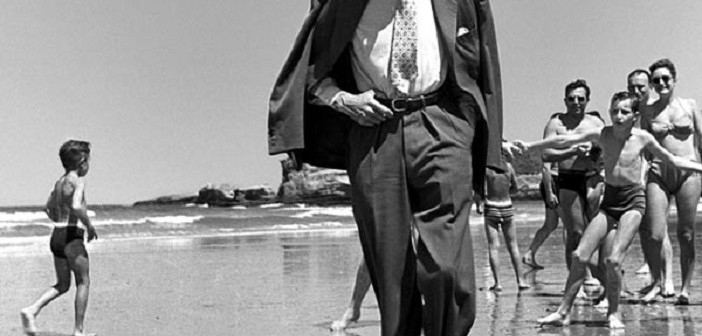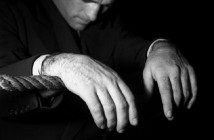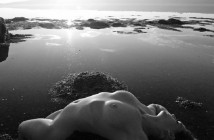Novelist F. Scott Fitzgerald coined the phrase “the rich are different” while hanging out with the rest of America’s expatriate “Lost Generation” who sailed away from the Prohibition Era “Roaring 20s” and sought inspiration from the salons and soirées along the Côte d’Azur in France.
Avant-garde filmmaker, artist and writer Jean Cocteau was part of the crowd, and Fitzgerald and his wife Zelda met him on more than one occasion. He was rich, he was different and he was openly bisexual, although the gay community claims him as one of theirs due to his long relationship with actor-director Jean Marais, who starred in Cocteau’s 1946 Beauty And The Beast, and Orpheus.
Dambier’s camera catching Cocteau strolling in high water pants on the beach in front of a group of young men evokes memories of his relationship with fifteen year old novelist Raymond Radiguet, begun in 1918. Cocteau, from old money with conservative political connections, kept young Raymond from post-World War I military service and even arranged for him to receive a prestigious literary award.
While some academics and Francophile culture vultures consider the Radiguet relationship a footnote in Cocteau’s life, the groundswell of contemporary gay interest in the relationship gives the story legs. Cocteau and his apologists have long claimed that the relationship with Radiguet did not have a sexual dimension.
But when Radiguet died young at age 20 in 1923, Cocteau, who was just nine years old when his father committed suicide, fell into depression and bouts of melancholy, becoming an opium addict who would require frequent clinical treatment and the relapses it often generates. Some of the work he did while on opium is considered by critics as top stuff.
While he was linked to Marlene Dietrich, Coco Chanel, and Edith Piaf, Cocteau’s private life, which is what increases personal brand value in today’s gossip-driven world, would have been a stretch for even a cameo in Woody Allen’s spoof Midnight In Paris.
What Jean Cocteau was all about was bravado. If you do a Google search using the words “Cocteau” and “bravado” you will likely come up with 200,000 hits, as this writer did.
Cocteau did not attend the Sorbonne or Beaux-Arts or the Iowa Writers Workshop. He was self-educated and had the social network and wealth that got him access to all the right people. When he wanted to do a modern dance spectacle with sets designed by Picasso, he didn’t need to sell the project; his other pal was the expatriate Russian impresario Diaghilev, founder of the Ballet Russes, who had the theatre. He was distant and ahead of his time like Andy Warhol, but he didn’t need the Factory to hold happenings and fish for money.
He was a good friend of Gertrude Stein and when the pro-Nazi Vichy government started deporting Jews to the death camps his friends helped protect her, creating a controversy that continues today.
Because culture has been popularized and globalized, what we remember of Apollinaire or André Gide and others from Cocteau’s crowd now gets dumped in that big circular file known as France. The man they called “The Frivolous Prince” was indeed frivolous. One reason André Malraux won the coveted Prix Goncourt literary award and Cocteau didn’t.




